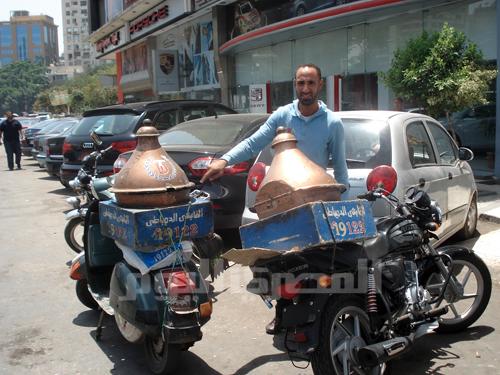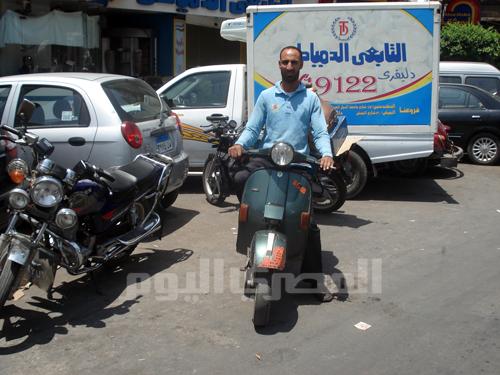
Egypt is a massive living organism — a web of ticking clocks, each set to a slightly different millisecond. With approximately 80 million in the country, 18 million of whom are woven into the streets and buildings of Cairo, the traffic of the city may crawl but many would say it is only by the will of God that it continues to flow at all. People are everywhere — driving, jumping off buses, walking, bicycling… ticking minute by minute through the days and nights of the city. Doctors, valets, belly dancers and beggars… Cairo keeps 18 million cogs in one of the world’s busiest wheels. This series takes a magnifying glass to one person, a representative of a job that keeps the city ticking — an eye-level shot that takes you through a day in the life of a cog in the wheel of Cairo. — Nevine El Shabrawy
“I drive for a living. So, if I didn’t swing fast, I would be sacked immediately,” Shaban Mohamed says, justifying his sudden swerves into different lanes while rushing through the congested streets with his own unwritten rules.
Mohamed, 32, is a delivery man whose day starts off at dawn so he has time to get ready and have a good breakfast before starting his 10-hour shift.
“My boss is pretty adamant about punctuality so I have to be up at 5 am before the early morning rush,” he says. “I am not an early riser but I have no other choice. There are far more morning orders than evening orders, so working early guarantees a decent amount of tips at the end of the day.”
Mohamed works for a popular chain restaurant known for its local food, including foul and tameyya sandwiches. Its profit mainly relies on breakfast orders, he says.
At 7 am, Mohamed walks into restaurant to find a bunch of his colleagues — dressed in the same uniform — standing in front of the open kitchen, ready to grab their orders and hit the street.
About an hour later, the place is overwhelmed with swift movements and increasing noise. The entire staff is now listening to instructions being given by their manager, who looks at this reporter, wondering what I am doing in the middle of staff area at this hour.
“You have three orders at once. Don’t be late, we still have plenty more to deliver,” says the manager while handing Mohamed sacks full of sandwiches.
Mohamed checks the addresses where he is about to head and mutters in an annoyed tone, “And he gets angry when we do not adhere to time limits.”
Mohamed's delivery area covers Mohandiseen, but sometimes he is asked to carry orders to places far away from this assigned zone.
“It is not about the physical toll of the job, but driving too far costs a lot of money when it comes to gasoline, especially during this rough time,” says Mohamed, referring to the ongoing fuel shortage.
“Sometimes I don’t find 80 octane gasoline, which forces me to use 90 octane. This costs me a fortune,” he says while taking a look inside the sacks and counting the sandwiches to make sure the order is right.
Mohamed makes about 25 rounds a day on his own motorcycle and gets paid LE4 for each round in addition to tips. However, as a father of three daughters and a son, his daily income barely covers his family expenses, including the LE600-per-month apartment the family rents.
Over the course of the day, his routine is the same: making a trip from the restaurant to customers over and over again. Most customers understand his tardiness when streets are jam-packed and greet him kindly with a tip. But, of course, this is not always the case, even after explaining the reason with apologetic smile.
At about 1 pm, things start to slow down; this is when Mohamed takes a short break for a quick snack to recharge for the remaining hours.
“I usually wait to have a heavy meal with my family,” he says, then takes his first bite from his sandwich, adding in a conversional tone, “Actually, they wait for me because I am the one who returns home late.”
When asked about how he feels about his days, he says, “I wish I could take up a second job to make more money. But the daily routine of my job is so grueling.”
Mohamed has been working as a delivery man for 10 years, including three years for a different restaurant, since quitting a job as a driver for a computer company.
“It was less hectic, but when I got married I looked for another job to secure a decent livelihood,” he explains while smoking a cigarette beside the restaurant’s entrance.
Then, his manager interrupts our talk, shouting his name from the kitchen. Mohamed stubs his cigarette out and tosses it into the street before resuming his whirlwind rides.
At around 4:45 pm, Mohamed has reached the restaurant looking annoyed. During the last 15 minutes of his shift, we discuss Egypt’s current political scene.
Mohamed says that he used to have better days before 25 January revolution. “The uprising has brought nothing but insecurity."
"Don’t get me wrong, I am not against the revolution itself,” he assures. “But things are getting worse. We got bullied in the streets several times and my colleagues’ motorcycles were looted at noon, some of which were parked in front of the restaurant.”
At 5 pm, after changing from his uniform, Mohamed shifts gears, disappearing between vehicles in a blink of eye, but this time with a smile.





